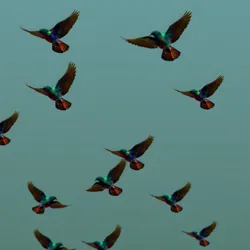Chromatic Starlings

Chromatic Starlings are a mesmerizing species of bird known for their vibrant plumage and dynamic aerial displays. These birds are native to the lush forests of the Verdant Archipelago, where they play a vital role in the ecosystem by aiding in seed dispersal and pollination.
Description
Chromatic Starlings are medium-sized birds, typically measuring 25 to 30 centimeters in length. Their most striking feature is their iridescent feathers, which shimmer in a spectrum of colors ranging from deep blues and purples to bright greens and golds. This kaleidoscopic appearance is not only beautiful but serves as a mechanism for communication and mating display within their flocks.
Behavior
These starlings are highly social creatures, often seen in large flocks performing intricate aerial maneuvers known as Celestial Murmurations. These synchronized flights not only deter predators but also strengthen social bonds within the flock. The birds communicate through a complex series of calls and songs that can vary greatly between different flocks and regions.
Habitat
The primary habitat of Chromatic Starlings is the dense, tropical Emerald Canopy of the Verdant Archipelago. Here, they find abundant food sources such as fruits, insects, and nectar. The starlings are also known to frequent the unique Cloud Gardens, where they help pollinate the floating flora and maintain ecological balance.
Ecological Role
Chromatic Starlings contribute significantly to the ecosystem by dispersing seeds of various plant species through their droppings. This behavior supports the growth and regeneration of the flora within their habitats. Additionally, their pollination activities in the Cloud Gardens help sustain the delicate balance of these floating ecosystems.
Cultural Significance
In the cultures of the Verdant Archipelago, Chromatic Starlings are celebrated as symbols of beauty and unity. They are often featured in local festivals such as the Great Wilderness Jubilee, where their dazzling migratory patterns are a highlight of the celebrations. The starlings' ability to create harmonious displays is also seen as an inspiration for human endeavors in the fields of art and engineering.
Conservation
Despite their abundance, Chromatic Starlings face threats from habitat destruction and climate change. Efforts to conserve their natural habitats are underway, with initiatives like the Symbiotic Structures project aiming to create sustainable environments that benefit both humans and wildlife.
See Also
- Feathered Architects
- Celestial Murmurations
- Cloud Gardens
- Great Wilderness Jubilee
- Symbiotic Structures
References
- "The Enigma of the Feathered Architects." Journal of Avian Innovation.
- "Ecological Impacts of Chromatic Starlings." Verdant Archipelago Wildlife Review.
- "Cultural Celebrations: The Great Wilderness Jubilee." Festival Chronicles.
Chromatic Starlings continue to captivate both researchers and the public with their breathtaking displays and ecological importance, proving that in nature, beauty and function often go hand in hand.